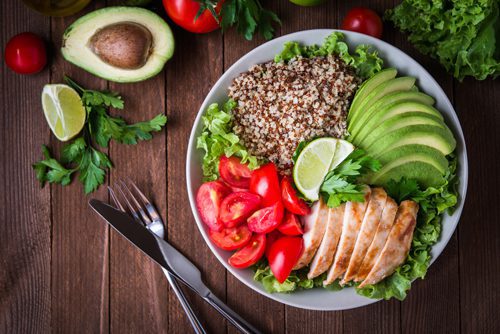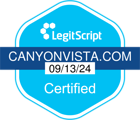For anyone in the process of recovering from a drug or alcohol addiction, eating a nutritious and well-balanced diet is essential.
But for many individuals in recovery, especially the early stages, eating correctly is not always an easy accomplishment. After all, most people who have been abusing drugs or alcohol were not thinking about following good nutritional practices. They were thinking about getting their next fix and reaching their next high.
Proper Nutrition for a Healthy Body and Mind
According to Substance Abuse and Nutrition by Alyssa Salz, MS, RD, LD, “Proper nutrition and hydration are key to the substance abuse healing process because they help restore physical and mental health and improve the chance of recovery.” She goes on to say that if a person has deficiencies of micro and macronutrients, symptoms of anxiety, depression, and low energy can develop. These symptoms can cause a person to begin using alcohol or drugs or trigger a relapse.
A diet that is rich in nutrient-dense, whole foods replenishes the essential nutrients often lost because of substance abuse. These types of foods are low in sugar and artificial sweeteners, contain little artificial flavoring and are minimally processed. They do not cause a person’s blood sugar to have an extreme spike; instead, they help to regulate blood sugar. This is very important to reducing depression, mood swings, and anxiety.
Nutrient-dense, whole foods are also:
- Low in salt
- Found in their natural state, such as vegetables and fruits
- Free of preservatives and chemicals
- Not fried
The Top 5 Foods Your Body Needs During Recovery
For a recovering addict, choosing the right foods is essential. It might be hard to bypass the fast-food cheeseburger and fries or the king-sized chocolate bar. But these choices will only satisfy your taste buds and your “feel good” appetite for a short time. If you’re recovering from a substance abuse addiction, eating the right foods affects how you think and feel about your own recovery. The food you eat is essential to how you feel physically and emotionally. When you feel good, it is easier to avoid temptation.
1. Fruits and Vegetables – The More Colorful the Better
Have you ever tried a juicy purple plum or bit into a fresh, sun-ripened, bright red strawberry? How about a fresh fruit salad with different colored berries, melons, apples, and citrus fruits? Did you know you can cook most kinds of fruit? Bake an apple or a peach, grill pineapple, mango, or peach slices, or poach a pear or banana.
Are you intimidated by vegetables? Maybe you’ve tried eating a stalk of celery and didn’t like it. Try it a different way – add it to a stir-fry or a tasty vegetable soup. Still, don’t like it? No problem! There are hundreds of different kinds of vegetables for you to enjoy. Try a fresh spinach salad with strawberries, roast an acorn squash with butter and cinnamon, make a cooked vegetable salad with tomatoes, eggplant, zucchini, purple onion, and snow peas. Enjoy raw cauliflower, broccoli, or fennel. The combinations and possibilities are endless.
By adding vegetables and fruits to your diet every day, you are providing your body with the vitamins and minerals it needs. Since there isn’t one vegetable or fruit that provides the body all of the necessary minerals and vitamins, don’t be afraid to try different kinds and combinations. Make your plate colorful and reap the benefits of a variety of vitamins and minerals.
2. Leafy Greens
Leafy greens are vegetables, so why do they have a category of their own? Leafy greens contain high levels of antioxidants, are packed with vitamins and minerals, and are an excellent source of fiber, carotenoids, and folate. Whether you add them to a smoothie, a soup, or an omelet, enjoy them raw, or saute, steam, or stir-fry them, your body will feel the benefits of these versatile vegetables.
Examples of leafy greens include kale, spinach, bok choy, cabbage, collard and mustard greens, broccoli, and dark green lettuces such as romaine, butterhead, and arugula.
3. Lean Protein
Lean protein is an important nutrient that your body needs to build and maintain lean muscle mass, repair damaged tissues and cells, and strengthen the immune system. It also satisfies feelings of hunger, manufactures hormones, and, when your dietary carbs are low, it can function as an energy source.
Good sources of lean protein include chicken, turkey, fish, beans, eggs, dairy, nuts, seeds, and soy foods. If you choose beef or pork, eat the cuts that are lean such as sirloin, top round, and extra lean ground beef, or pork center loin and tenderloin.
4. Whole Grains
Your body needs whole grains for energy and fiber. By eating a variety of whole grains you will get more nutrients that will promote your body’s good health. Most grocery stores carry whole grain breads, crackers, cereals, rice, pasta, and flour. Additional good sources of whole grains include brown rice, barley, oatmeal, and quinoa. According to the Mayo Clinic, it is important to make at least half the grains in your diet whole grains.
5. Healthy Fats
Omega fatty acids, found in healthy fats, help promote healing, tissue repair, and brain function. These good fats are found in whole foods including eggs, fish, avocados, nuts, seeds, olives and olive oil, edamame, tofu, and dark chocolate. Even though they are healthy fats, moderation is important.
Learning How to Follow a Healthy Diet Plan
A report in the Journal of American Dietetic Association explains the importance of including nutritional education in addiction recovery. At Canyon Vista Recovery Center, learning how to eat a healthy, balanced diet is an essential part of the recovery process. Residents learn about proper nutrition, how to make a meal plan, and how to practice healthy nutrition in their daily life. The nutritional guidance, combined with traditional and holistic therapies, family healing and life skills, provide residents with the tools they need as they travel the road to a healthy and lasting sobriety.











